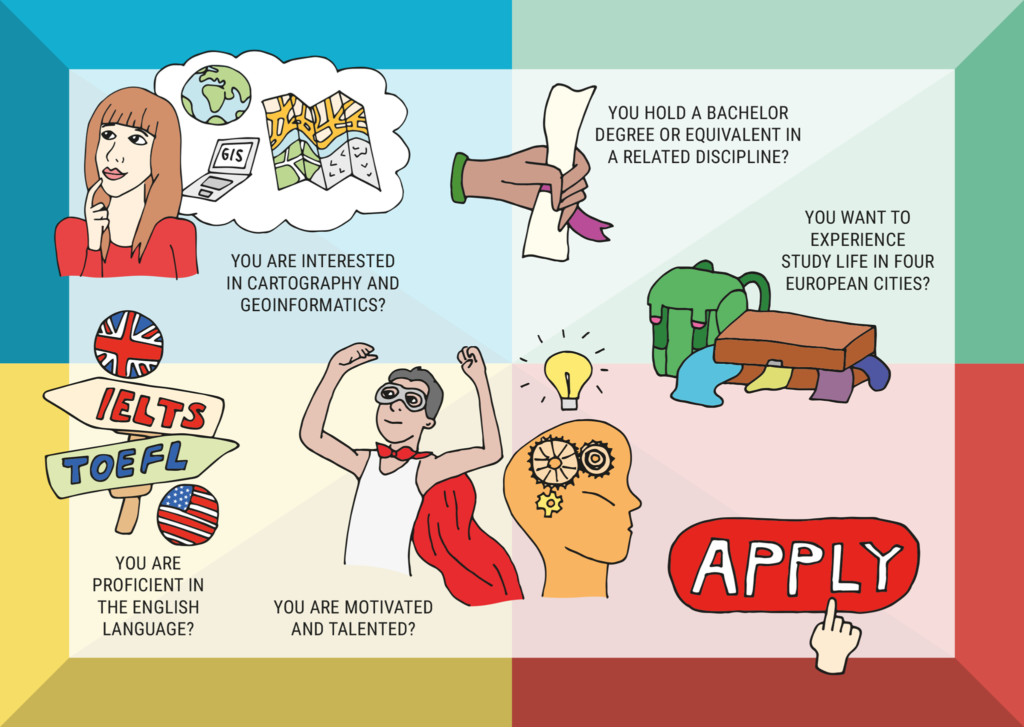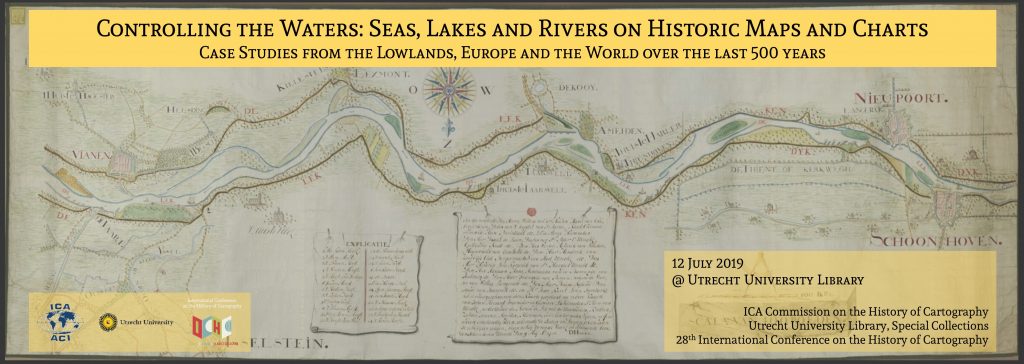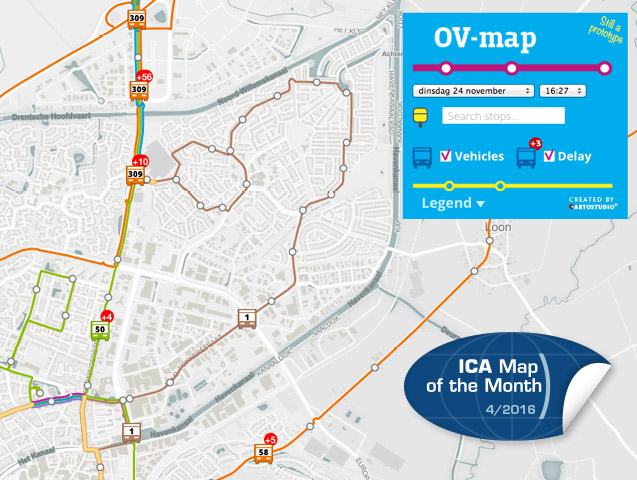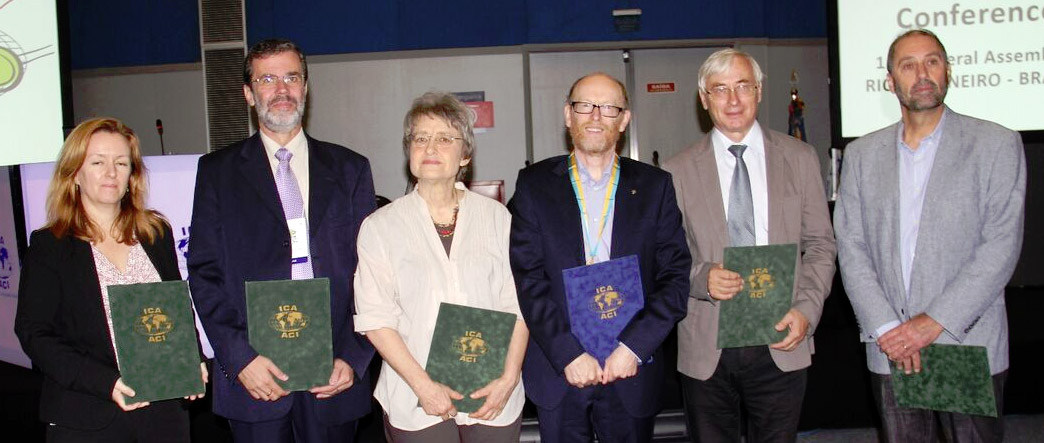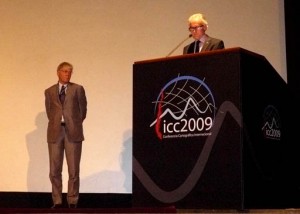A very special man, one of the great geographers and cartographers of our time – known to many as ‘Mr ICA’ – died on 1 May 2002. Not a moment of his often hyperactive life was wasted as he expanded his knowledge of the World and its people.
This genuinely charismatic man shared himself constantly through teaching, organisation and leadership, influencing others and helping change things for the better. His powerful intellect and special capacity for building bridges of friendship were in evidence throughout his life.
Born on 12 April 1912, his early childhood was spent in Amsterdam and in nearby Hilversum, where he experienced some of the difficulties, if not the damage, associated with WW1. After completing elementary studies at Hilversum High School he attended the State University of
Utrecht to read geography and history and went on to teach at grammar schools in Hilversum and The Hague. The Netherlands were invaded early in WW2 and this painful occupation continued until liberation in 1945. As a member of the Dutch Army, and true to his own character, Ormeling refused to succumb and joined the underground movement.
The War also affected the Netherlands’ Indonesian colonies where the Pacific conflicts had profound effect. In 1945, at the end of the Japanese occupation, Ormeling was sent, as part of an expeditionary force, to restore order to that troubled land. During the ensuing war-filled years, as a geographer/cartographer he was transferred from field activities to become part of the new Geographical Institute (formed in 1947 as part of the former government mapping organisation) in the capital, Batavia (Jakarta). Here he was involved in many important cartographic and geographical projects. With independence in 1949 most of the Dutch returned to Europe, but not Ormeling. The fact that he was asked, by those who had previously been foes, to remain and continue his work (in office and field), is convincing evidence of his special intellectual and personal qualities. Full recognition of this came in 1950 when he was appointed (at the young age of 37) as Head of the Institute, with almost 50 employees. The work evolved to include not only small-scale mapping and increasingly important geographical surveys of the country but also the education and training of the staff of the Indonesian Topographic Service.
During the years that followed he developed his knowledge of the country, in particular the Island of Timor (almost twice the size of the Netherlands) which became a focus of research into ethnic and socioeconomic factors. His pioneering study, ‘The Timor Problem, a Geographical Interpretation of an underdeveloped island’, not only gained him a Doctorate of Social Sciences from the University of Indonesia, but, on publication, it became a best-seller.
By the end of his 20-year Indonesian sojourn in 1955 he had demonstrated unequivocally his intellectual abilities in geography and mapping, his facility for organisation and leadership and his capacity for work. He had also developed a deep understanding of the people of developing countries and their problems.
His return home, at the age of only 43, was to herald a new phase in his life.
Having joined J.B. Wolters of Groningen, his major work would lie within cartography, especially the modernisation of their main atlas products.
Until 1963 he was fully employed by the company but continued thereafter as an expert consultant. He not only edited nine editions of the Grote Bosatlas and six editions of the Kleene Bosatlas but oversaw major changes in level of collaboration between users (teachers) and producers, in map style, content and design, as well as in improvements in effectiveness and economy of production. However, in parallel with these outstanding achievements he would also begin to develop (in his ‘spare time’!) his facility to motivate colleagues and stimulate links within geography and mapping, at home and abroad. The first result was a new Cartographic Section in the Royal Netherlands Geographical Society (which he chaired until 1968) and he also helped consolidate the many cartographic groups within the Netherlands into The Dutch Cartographic Society in 1975. He became the first President (1967–71) of the new enlarged Royal Netherlands Geographical Society (now incorporating many small geographical associations).
Between 1967 and 1984 he was a major representative of both the Netherlands and the ICA on the UN Group of Experts on Geographical Names and chaired the Working Group on Education and Training in Toponymy.
Although his atlas consultancy work continued after departure from Wolters, he was appointed in 1964 as Professor of Economic Geography at the University of Amsterdam and established a Research Institute in the subject. In 1971 he was appointed Professor at ITC following the Institute’s transfer from Delft to Enschede. There he established and became Head of the new Department of Cartography.
He had already noted the demise of traditional cartography with the rise of the quantitative revolution in Geography in the 1960s and ensured that the new ITC department was fully equipped with the latest computer facilities.
During his early years with Wolters, Ormeling (with Cornelius Koeman) led key discussions about the proposed establishment of the ICA, which eventually took place in Bern in 1959. He was a firm supporter of its founding principles which emerged during the first five years under Eduard Imhof’s presidency, and enthusiastically accepted election to the position of Secretary/Treasurer at the London/Edinburgh Conference and General Assembly (1964). The next technical conference took place three years later in Amsterdam under his directorship and is believed to have established a new informal and friendly family atmosphere which would become commonplace at future events. His pro-active and energetic 12-year support of Presidents Thackwell, Salitchtchev and Robinson is now legendary, supported most generously by ITC. He was elected President in Moscow (1976) and proceeded through two strong terms, ably supported by Olof Hedbom as Secretary/Treasurer, ending in Perth, Australia in 1984. At his final Conference/General Assembly in Morelia he presented his personal record of ICA entitled ‘ICA 1959–1984: The First Twenty-five Years of the International Cartographic Association’. His own 20-year period as a senior office-holder saw the introduction of many significant changes, relating to Commissions, Working Groups, statutes, etc.
A special example was the establishment of a medal for ICA’s highest distinction in recognition of the Swedish initiator of the ICA, Carl Mannerfelt. His personal experience of working for ICA was also memorable, punctuated by such as travel mishaps, a near fatal car crash in West Africa and a scary encounter (accompanied by John Bartholomew) in the bullring at the Madrid Conference of 1974!
Not surprisingly Ormeling has a long and distinguished list of publications extending from his Doctoral Thesis. It includes papers, books and atlases and echoes the many changes which have taken place during these turbulent years of cartography in the second half of the twentieth century. His retirement years were only slightly less busy than before as he continued to research, publish and accept speaking engagements.
His own lifetime of achievement has been awarded on many occasions, examples being Honorary Membership of the Dutch Cartographic Society, Membre d’Honneur de la Societé de Géographie de France, Honorary Fellowships of the Australian Institute of Cartographers, The Hungarian Academy of Sciences, The Polish Geographical Society, and the ITC itself, The British Cartographic Society Medal and, in 1987, the Carl Mannerfelt Medal. In 1978 he was appointed ‘Knight of the Order of the Netherlands Lion’ by the Queen of the Netherlands.
Although he missed the first ICA General Assembly in Paris, 1961 through work, he attended every other Technical Conference and General Assembly between 1962 and 1987, and continued as a regular visitor at ICA after his official responsibilities came to an end. He was, sadly, unable to attend the ICC 2001 in Beijing, China, but love and respect radiated from the international audience at the opening ceremony when he sent his video greeting. His passing has undoubtedly left a painful gulf in the lives of many, especially his dear wife, Rini (often described as the ‘Queen of ICA’ for her own outstanding support for him and our Association), and the children Piet, Hein, Ferjan, Ina, and Erik, Sonja and Roger. Apart from his great circle of ICA friends the other special people who will always treasure his memory are his students in the Netherlands and across the World. However our friend and colleague Fer Ormeling has left much more than a memory. This was a truly charismatic man, described by friends as ‘a demanding organiser’, ‘a fascinating speaker and entertainer’, and ‘a talented linguist… with a good sense of humour’.
This writer will always remember the warmth of his company, his ever-present smile and the twinkle in his eye. A fundamental law of physics states that energy cannot be destroyed, only changed in form. The energy released by Ferdinand J. Ormeling during his dynamic life of creativity, guidance and leadership, is thus still active within people and organisations throughout the world today. His was a life that truly made a difference.
M. Wood
Acknowledgements: Hedbom, O, Bohme, R, 1989, ‘Ferdinand J Ormeling: a Biography’, in ‘Cartography, Past, Present and Future’, Rhind, D W, and Taylor, D R F, Eds. Elsevier, 1989.



